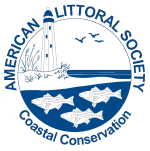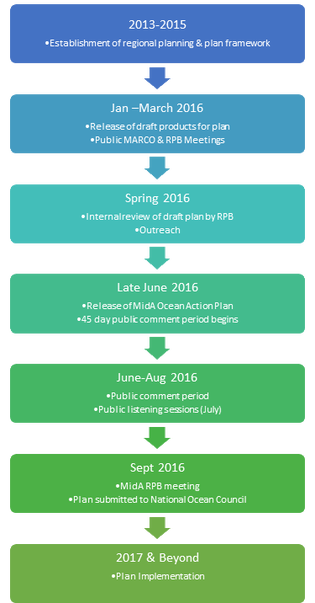The National Ocean Policy and Ocean PlanningOn July 19, 2010, President Obama issued Executive Order 13547 establishing our nation’s first comprehensive National Ocean Policy to protect, maintain, and restore our ocean, coastal, and Great Lakes natural resources for present and future generations. The National Ocean Policy is founded on the recommendations of the U.S. Commission on Ocean Policy and the Pew Oceans Commission and was developed through a lengthy process of engagement with industry representatives, coastal businesses, recreational users, scientists and other stakeholders. A National Ocean Council was established in order to tackle one of the strongest recommendations made by these two bipartisan commissions: to provide high-level and sustained coordination of the work of our federal agencies on ocean, coastal, island and Great Lakes issues.
Our ocean, coasts, and Great Lakes are places of wonder and beauty as well as economic engines that provide valuable jobs, food, recreation, energy resources, and tourism. Ensuring the health and resiliency of our ocean, coasts, and Great Lakes is crucial to the health of our nation’s economy. Our ocean and coasts support tens of millions of jobs that are a vital part of the U.S. economy. In 2004 alone, the ocean-dependent economy generated $138 billion of U.S. GDP and employed 2.3 million Americans. Coastal tourism & recreation dominate both employment and GDP in the ocean economy sectors with 1.7 million jobs and nearly $70 billion of GDP. Given the natural beauty of these ecosystems and economic dependence we have on our ocean, coasts, and Great Lakes, it is imperative that we implement the National Ocean Policy to ensure ecosystem protection and sustainable management of these ecosystems for future generations. Implementation of the National Ocean Policy also will help move us away from the fragmented management approach that has led to imperiled ecosystems and move our nation toward comprehensive ocean management and protection and restoration of our ocean, coasts, islands and Great Lakes. The American Littoral Society has been working since 2009 to help establish the now National Ocean Policy. The Society is co-lead of the Healthy Oceans Coalition, a grassroots coalition comprised of conservation organizations and ocean users across the country engaged in supporting full implementation of the National Ocean Policy. What is the National Ocean Policy and how is it related to regional ocean planning?
The National Ocean Policy (NOP) was established in 2010 by Executive Order #13547. The aim is to improve our planning so that we protect important habitat and ocean wildlife, plan to address our changing ocean, coastal and Great Lakes ecosystems, build climate resilience and encourage sustainable use while providing greater certainty for businesses and other ocean users. The National Ocean Policy includes 9 priorities, one of which includes creating and implementing regional marine planning. What is ocean planning?
Ocean planning (also referred to as coastal and marine spatial planning or marine planning) is a process that uses the best available science and data to help regions work to reduce conflict and improve coordination among government, industry, and community stakeholders. The goal is to improve ocean resource management, increase public engagement in decision making, strengthen community resilience, and ultimately ensure a healthy ocean and support sustainable ocean uses. What is the Mid-Atlantic Regional Planning Body?
In 2013, the Mid-Atlantic Regional Planning Body (MidA RPB) was created to improve planning and coordination among the many agencies and groups that share an interest in this coastal zone. Among these stakeholders are BOEM, Homeland Security, the Navy, Coast Guard, NOAA, US Army Corps of Engineers, the marine industry, telecommunications and energy companies, state economies, tribal communities and fisheries. The goal is to eliminate conflicts between all those parties and improve communication and planning, all while protecting and improving the ocean environment. What is the Mid-Atlantic Regional Council on the Ocean?
A state partnership called the Mid-Atlantic Regional Council on the Ocean (MARCO) was established in 2009. MARCO represents the interest of the five states in this regional zone to create opportunities for states to address common regional concerns. Although states work independently to implement planning measures in their own waters, collaboration with federal authorities, which have jurisdiction over federal waters and many ocean uses, is crucial to ensure proper management decisions. MARCO works closely with the MidA RPB on ocean planning in the Mid-Atlantic. |
Frequently Asked Questions
Planning Timeline |
|
MidAtlanticOceanPlanning.org
is a project website for the American Littoral Society. The American Littoral Society promotes the study and conservation of marine life and habitat, protects the coast from harm, and empowers others to do the same. |
18 Hartshorne Drive Highlands, NJ 07732
732-291-0055 |


